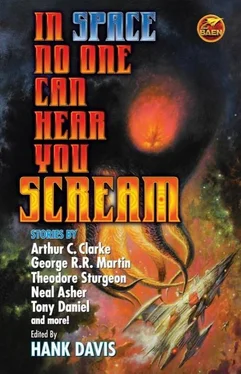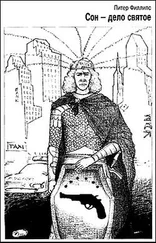Питер Филлипс - In Space No One Can Hear You Scream
Здесь есть возможность читать онлайн «Питер Филлипс - In Space No One Can Hear You Scream» весь текст электронной книги совершенно бесплатно (целиком полную версию без сокращений). В некоторых случаях можно слушать аудио, скачать через торрент в формате fb2 и присутствует краткое содержание. Город: Riverdale, NY, Год выпуска: 2013, ISBN: 2013, Издательство: Baen Books, Жанр: Фантастика и фэнтези, на английском языке. Описание произведения, (предисловие) а так же отзывы посетителей доступны на портале библиотеки ЛибКат.
- Название:In Space No One Can Hear You Scream
- Автор:
- Издательство:Baen Books
- Жанр:
- Год:2013
- Город:Riverdale, NY
- ISBN:978-1-4516-3941-4
- Рейтинг книги:4 / 5. Голосов: 1
-
Избранное:Добавить в избранное
- Отзывы:
-
Ваша оценка:
- 80
- 1
- 2
- 3
- 4
- 5
In Space No One Can Hear You Scream: краткое содержание, описание и аннотация
Предлагаем к чтению аннотацию, описание, краткое содержание или предисловие (зависит от того, что написал сам автор книги «In Space No One Can Hear You Scream»). Если вы не нашли необходимую информацию о книге — напишите в комментариях, мы постараемся отыскать её.
In Space No One Can Hear You Scream — читать онлайн бесплатно полную книгу (весь текст) целиком
Ниже представлен текст книги, разбитый по страницам. Система сохранения места последней прочитанной страницы, позволяет с удобством читать онлайн бесплатно книгу «In Space No One Can Hear You Scream», без необходимости каждый раз заново искать на чём Вы остановились. Поставьте закладку, и сможете в любой момент перейти на страницу, на которой закончили чтение.
Интервал:
Закладка:
“No,” Irizarry said mildly. “I don’t.” But Mongoose, still pink, was coiling down his arm to investigate the glass—not its contents, since the interest of the egg-whites would be more than outweighed by the sharp sting to her nose of the alcohol, but the upside-down cone on a stem of a martini glass. She liked geometry. And this wasn’t a story that could hurt anyone.
He said, “I was working my way across Jupiter’s moons, oh, five years ago now. Ironically enough, I got trapped in a quarantine. Not for vermin, but for the black rot. It was a long time, and things got . . . ugly.”
He glanced at her and saw he didn’t need to elaborate.
“There were Arkhamers trapped there, too, in their huge old scow of a ship. And when the water rationing got tight, there were people that said the Arkhamers shouldn’t have any—said that if it was the other way ’round, they wouldn’t give us any. And so when the Arkhamers sent one of their daughters for their share . . .” He still remembered her scream, a grown woman’s terror in a child’s voice, and so he shrugged and said, “I did the only thing I could. After that, it was safer for me on their ship than it was on the station, so I spent some time with them. Their professors let me stay.
“They’re not bad people,” he added, suddenly urgent. “I don’t say I understand what they believe, or why, but they were good to me, and they did share their water with the crew of the ship in the next berth. And of course, they had cheshires. Cheshires all over the place, cleanest steelship you’ve ever seen. There was a litter born right about the time the quarantine finally lifted. Jemima—the little girl I helped—she insisted they give me pick of the litter, and that was Mongoose.”
Mongoose, knowing the shape of her own name on Irizarry’s lips, began to purr, and rubbed her head gently against his fingers. He petted her, feeling his tension ease, and said, “And I wanted to be a biologist before things got complicated.”
“Huh,” said Sanderson. “Do you know what they are?”
“Sorry?” He was still mostly thinking about the Arkhamers, and braced himself for the usual round of superstitious nonsense: demons or necromancers or what-not.
But Sanderson said, “Cheshires. Do you know what they are?”
“What do you mean, ‘what they are’? They’re cheshires.”
“After Demon and Spider John . . . I did some reading and I found a professor or two—Arkhamers, yes—to ask.” She smiled, very thinly. “I’ve found, in this job, that people are often remarkably willing to answer my questions. And I found out. They’re bandersnatches.”
“Colonel Sanderson, not to be disrespectful—”
“Sub-adult bandersnatches,” Sanderson said. “Trained and bred and intentionally stunted so that they never mature fully.”
Mongoose, he realized, had been watching, because she caught his hand and said emphatically, Not.
“Mongoose disagrees with you,” he said and found himself smiling. “And really, I think she would know.”
Sanderson’s eyebrows went up. “And what does Mongoose think she is?”
He asked, and Mongoose answered promptly, pink dissolving into champagne and gold: Jagular. But there was a thrill of uncertainty behind it, as if she wasn’t quite sure of what she stated so emphatically. And then, with a sharp toss of her head at Colonel Sanderson, like any teenage girl: Mongoose.
Sanderson was still watching him sharply. “Well?”
“She says she’s Mongoose.”
And Sanderson really wasn’t trying to threaten him, or playing some elaborate political game, because her face softened in a real smile, and she said, “Of course she is.”
Irizarry swished a sweet mouthful between his teeth. He thought of what Sanderson had said, of the bandersnatch on the Jenny Lind wriggling through stretched rips in reality like a spiny, deathly puppy tearing a blanket. “How would you domesticate a bandersnatch?”
She shrugged. “If I knew that, I’d be an Arkhamer, wouldn’t I?” Gently, she extended the back of her hand for Mongoose to sniff. Mongoose, surprising Irizarry, extended one tentative tendril and let it hover just over the back of Sanderson’s wrist.
Sanderson tipped her head, smiling affectionately, and didn’t move her hand. “But if I had to guess, I’d say you do it by making friends.”
Theodore Sturgeon
The ship was crewed with men who had been deliberately, painstakingly driven insane, except for one man. They had told him that he wasn’t insane—but then, they might have been lying to him. Then they sent them to a place in space from which ships did not return. The mission was insane in every meaning of the word . . .
Theodore Sturgeon (1918-1985) was one of the great writers of science fiction’s “golden age” in the 1940s, and by the 1950s was renowned for his three-dimensional characters and his highly individual style. His early works, of which “Medusa” is an example, were elegantly constructed, fast-paced stories told by a wisecracking narrator, but he soon developed a fluent prose poetry of style that accomplished wonders. Another notable prose poet, Ray Bradbury, admitted the strong influence Sturgeon’s writing had on his own work in the introduction he wrote for Without Sorcery , Sturgeon’s first story collection. His now-classic novel, More Than Human , won the International Fantasy Award, the first of a number of awards (though there should have been many more). The distinguished editor and reviewer Groff Conklin once wrote, “You don’t read [Sturgeon’s] stories. They happen to you.” (Nailed it, Mr. Conklin!) Two Star Trek episodes were scripted by him, and one of them, “The Amok Time,” was a high point of that program. He wrote over 200 short stories, all of which have now been collected in thirteen volumes published by North Atlantic Books. (Many thanks to the late Paul Williams and Noël Sturgeon for bringing this miracle to pass.) He was also the author of unforgettable horror stories, such as “It!,” “The Professor’s Teddy Bear,” “Farewell to Eden,” and, of course, “Bianca’s Hands.” Not to mention the story which follows . . .
MEDUSA
Theodore Sturgeon
I wasn’t sore at them. I don’t know what they’d done to me, exactly—I knew that some of it wasn’t so nice, and that I’d probably never be the same again. But I was a volunteer, wasn’t I? I’d asked for it. I’d signed a paper authorizing the department of commerce of the league to use me as they saw fit. When they pulled me out of the fleet for routine examination, and when they started examinations that were definitely not routine, I didn’t kick. When they asked for volunteers for a project they didn’t bother to mention by name, I accepted it sight unseen. And now—
“How do you feel, Rip?” old Doc Renn wanted to know. He spoke to me easylike, with his chin on the backs of his hands and his elbows on the table. The greatest name in psychoscience, and he talks to me as if he were my old man. Right up there in front of the whole psycho board, too.
“Fine, sir,” I said. I looked around. I knew all the doctors and one or two of the visitors. All the medicos had done one job or another on me in the last three years. Boy, did they put me through the mill. I understood only a fraction of it all—the first color tests, for instance, and the electro-coordination routines. But that torture machine of Grenfell’s and that copper helmet that Winton made me wear for two months—talk about your nightmares! What they were doing to or for me was something I could only guess at. Maybe they were testing me for something. Maybe I was just a guinea pig. Maybe I was in training for something. It was no use asking, either. I volunteered, didn’t I?
Читать дальшеИнтервал:
Закладка:
Похожие книги на «In Space No One Can Hear You Scream»
Представляем Вашему вниманию похожие книги на «In Space No One Can Hear You Scream» списком для выбора. Мы отобрали схожую по названию и смыслу литературу в надежде предоставить читателям больше вариантов отыскать новые, интересные, ещё непрочитанные произведения.
Обсуждение, отзывы о книге «In Space No One Can Hear You Scream» и просто собственные мнения читателей. Оставьте ваши комментарии, напишите, что Вы думаете о произведении, его смысле или главных героях. Укажите что конкретно понравилось, а что нет, и почему Вы так считаете.









